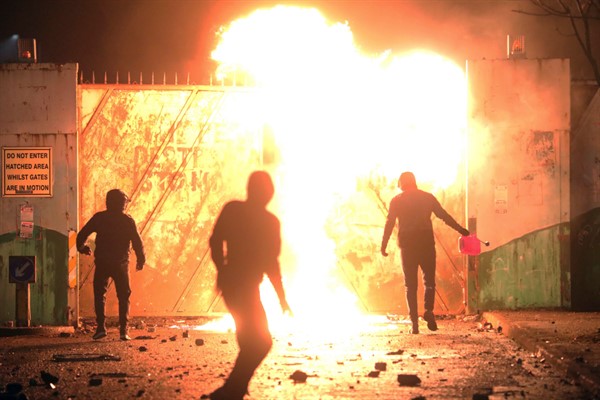BELFAST, Northern Ireland—For more than a week earlier this month, Northern Ireland was rocked by riots in pro-British unionist communities, with frequent outbursts of violence in areas bordering on pro-Irish nationalist neighborhoods. Thankfully, no one was killed, but almost 90 police officers were injured in efforts to quell the unrest and keep youths on either side of the “peace walls”—effectively enhanced security barriers separating the two communities—from attacking one another.
The main trigger for the disorder was the recent decision by local authorities not to prosecute leaders of the staunchly nationalist Sinn Fein party for attending the funeral last summer of Bobby Storey, a former Irish Republican Army commander. The decision contravened the spirit, if not the letter, of the law underpinning coronavirus restrictions on mass gatherings, and was thus particularly insulting to the families of those who have died from COVID-19. Unionists were further outraged that Sinn Fein appeared to be acting above a law that it helped create through the party’s role in the regional power-sharing government in Belfast.
Anger over the incident, however, also reflects a broader and common narrative in Northern Ireland that depicts Irish nationalism as ascendant. This partisan perspective, promoted by unionist commentators, presents the region’s peace process as one of continual unionist concessions to nationalists. It ignores the obvious fact that the move toward equality for the two communities was bound to improve the relative standing of the nationalists, subjected as they were to significant discrimination under the previous system of unionist dominance. It also disregards the fact that the political settlement that ended most violent conflict between the two communities, the 1998 Good Friday Agreement, delivered unionism’s key objective: nationalists’ acceptance of the region’s union with Britain, rather than reunification with Ireland, and of the principle that the constitution could only change with the consent of a majority in Northern Ireland.

